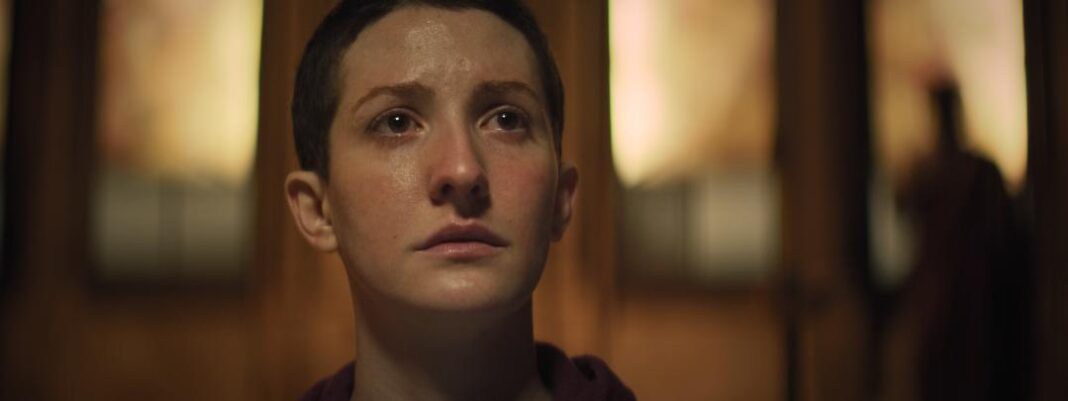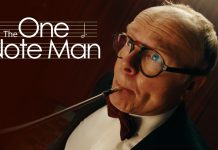Film-maker James Kautz focuses on the challenges of transgender individuals within the context of a single relationship in the new short FRANKIE.
Film And TV Now spoke with the film-maker about the short.
FILM AND TV NOW: The short highlights a crucial issue involving the emotional conflicts of a transgender person. Where do you feel transgender people are making progress in the world?
JAMES KAUTZ: As a cisgender person, I can’t speak for the trans community obviously, but as someone who continues to work to be an ally, I will say trans visibility is certainly growing. Which is incredible and hard fought.
However, visibility without safety can breed a dangerous backlash. You can see that in the staggering amount of current, anti-trans legislation across the US directed at denying trans youth self-affirming healthcare, the right to play sports, to simply just self-identify. So while trans visibility is certainly ‘progress’, there’s still a long way to go in terms of guaranteeing safety and equality for trans folx.
Film is such a powerful way of connecting people with differing beliefs. It can help to remove politics and allow viewers to empathize with another’s situation and perspective. As FRANKIE is really a film about being seen on one’s own terms, despite gender, I hope we’re indeed contributing to that connection and, in the long run, the safety that we truly need with trans visibility.
FTVN: Tell us about your cast.
JK: The cast of FRANKIE is the heart of our film. Most of the actors I’d worked with through NYC theatre, but others I met for the first time on set.
And Morgan, who plays Frankie and is also a Producer on the film, is my spouse, so we’ve worked together on countless projects over the years and there’s simply no one I’d trust more to rest the weight of an entire film on.
It was genuine magic to watch our cast build their own specific group dynamic, to personalize the script and their characters. I was very lucky to have them.
FTVN: Tell us about your production team.
JK: The production team was like a finely oiled machine, to be honest. Most had worked together before and they brought that synergy to Frankie. We knew that once the actors started locking in, we’d want to give them the space to build up momentum and really stay out of their way. We lit the room simply, with overhead lights so we wouldn’t need to pause for long with different set ups. The production team really helped to keep us moving smoothly and prioritizing the performances.
FTVN: Where did you shoot and for how long?
JK: We shot for two days in Manhattan, NYC, in this incredible basement of a massive, mid-town church.
FTVN: How did you raise finance for the short?
JK: I get asked a lot about fundraising. It’s definitely the hardest mountain to climb when making art. I wish there was an easier answer or some secret, but unless you’re independently wealthy, you just have to ‘make the asks’.
For FRANKIE, I pitched the film to folks who I’d met through producing theatre in NYC for years, and folks I’d met at industry events. The story stuck with people and we were very lucky to assemble a small group of Executive Producers who really made the movie possible.
FTVN: Given the potential of what a transgender protagonist could offer in terms of storytelling, where do you feel are those stories in terms of context and genre?
JK: I honestly think we’re heading towards a time when gender will play less and less a role in casting, when a trans actor doesn’t have to represent just a trans experience, but can instead simply play characters in search of universally recognized needs. I hope that’s where we’re heading, at least.
FTVN: Following on from that, is there a specific current film or TV show that you would love to see incorporate more of the themes explored in FRANKIE?
JK: Oh God, confronting gender norms and masculinity in Pro Wrestling might be pretty fun?
FTVN: You are the Founding Artistic Director of the award winning off-Broadway Theatre Company The Amoralists. Tell us more about the Company and how have you kept active given the current plight of theatres worldwide?
JK: Theatre will always be my home and it’s been a bit heart-breaking to have our entire industry shuttered for over a year now with the pandemic – though completely warranted.
The Amoralists have been building new plays for production, from the ground up, for over 15 years now, stories that challenge the status quo and push on our country’s preconceptions. Doing that in front of a living, breathing, right-there-audience teaches you accountability for what you make, and I’m definitely trying to bring that sensibility to my films.
FTVN: Lead actor Morgan Ruaidhri O’Sullivan is a very creative voice highlighting like-minded issues about transgender rights etc. How has Morgan helped you with your own projects?
JK: Well, Morgan is my spouse. We’ve been together for almost 8 years. So they’ve helped me with everything. Hahaha. They’re literally the most incredible artist I’ve ever worked with. Their barometer for truth, for courage, for authenticity is razor sharp and unyielding. And their passion for social justice is as strong as their desire to make work, so I am very, very honored and lucky to have them in my life.
FTVN: Do you see the short as a potential healing tool for transgender individuals and their affected families and partners?
JK: We genuinely hope so. In the beginning, I think you have to set out to tell a story that means everything to you, and just hope that others feel the same out there once it goes out into the world.
Morgan and I have watched how FRANKIE has changed our own family’s understanding of gender. It’s bridged some gaps of understanding when it comes to pronouns and deadnames and masculinity and vulnerability. That’s definitely the power of film and art. It puts us into each other’s shoes in a way that politics just can’t.
FTVN: The film is screening at the Atlanta Film Festival. Tell us more about this festival and how has the festival community helped films like yours to be seen, given the essential changes to viewing films online compared to a live event in previous years?
JK: Being a part of the Atlanta Film Festival is pretty humbling, to be honest. The films that I’ve seen so far in the festival are just truly extraordinary. To be among them, I feel very, very honored.
And I LOVE that festivals are more available online now. I hope it’s a hybrid model that lasts past this pandemic. Though as a film-maker, I’ve absolutely missed the opportunity to watch my film in real-time on a big screen and talk with folks after.
FTVN: How has the global situation affected your development and evolution as a film-maker?
JK: I think being forced to sit tight and hunker in has actually helped me as a film-maker. I’ve written and directed two other fairly large shorts over the last 8 months (all COVID compliant). It’s that theatre-maker energy. Morgan and I get restless pretty quickly and we’ve certainly poured that into more films!
FTVN: Finally, what are you most proud of about this short film?
JK: I’m very proud that we made the film we set out to make. We took the time and care to ensure we didn’t need to compromise on anything. I’m proud of that and I can’t wait to make another one!


































